Spring stages boast spectacular shows for families — from musical romps to historical deep dives — take your pick of theater, music or dance. Plus, learn about the kindie performers who are crooning to a new generation of resisters.
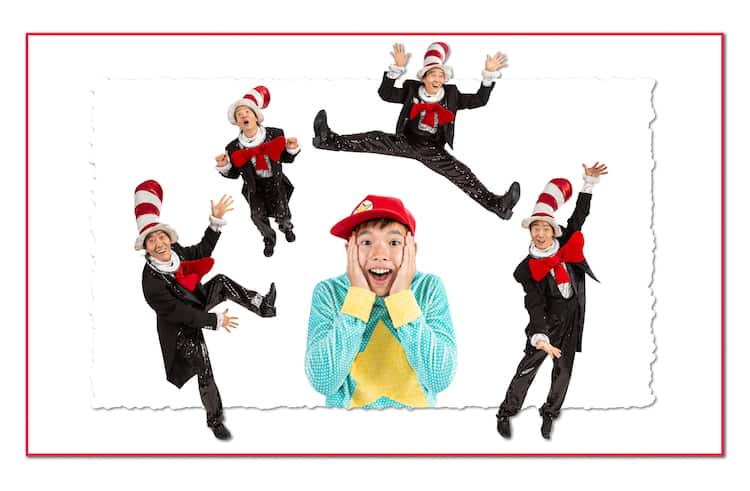
Oh, the Thinks You Can Think!
Seussical
May 2–31
Northwest Children’s Theater
Most enjoyed by children ages 4 and up
This May, get ready for some madcap magic as Northwest Children’s Theater brings the kid crowd-pleaser Seussical to their stage.
“Dr. Seuss tapped into something magical in his work and his rhyme and illustrations translate so beautifully to the stage,” says John Ellingson, NWCT associate artistic director. He is designing sets and props for Seussical and hints at some puppetry magic, too. The musical brings Seuss stories and characters together in one rollicking romp that includes songs and silliness, Horton the Elephant, and of course, the Cat in the Hat.
Darren Sze plays JoJo, the youngster who goes on a grand adventure with the show’s iconic Cat. “JoJo likes the mystery and the wildness of the Cat,” says the 14-year-old actor. “The Cat lets JoJo use his thinks — and his imagination — whenever and however he wants.”
Seussical gleans its magic from the power and freedom of imagination. “This is a beautiful story for the theater,” says Heath Hyun, who plays the Cat in the Hat. “It lends itself to a collaborative spirit. It starts on a blank stage — a space where imagination and images get to come alive.”
With any great adventure there are moments of joy, jokes, drama, and some small scares. Younger kiddos should beware the bad monkeys (and a kangaroo). But never fear, the Cat is there — and he’s very funny. “If it ever gets too scary the Cat is there to reassure you that we’re going to be OK,” says Ellingson.
Seussical is a big, fun blast of a standard box musical, and this staging offers refreshing twists in inclusive casting. Two of the leading actors are of Asian descent: Sze is Asian-American and Hyun is Korean-American. “It’s important,” says Hyun. “I really appreciate that theater companies are making room for all stories in the ecosystem. There’s room for all kinds of stories in a season — for all communities to feel like stories of theirs are being represented.”
“We wanted to do what was right for our audience. It’ll be a better show, a more fun show, with people of different sizes, looks and sounds,” explains Ellingson. “We believe that you don’t ever have to do what’s been done before, ever.”
Also Playing:
Elephant & Piggie’s We are in a Play is touring in Portland, Hillsboro, Sherwood, Salem and Gresham, March through May. For tickets and information, check out nwcts.org.
Real Talk for Real Kids
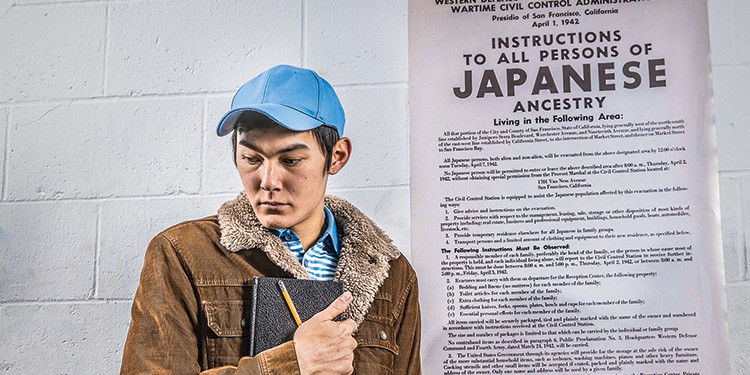
The Journal of Ben Uchida: Citizen 13559
February 29 to March 22
Oregon Children’s Theatre
Best for ages 10 and up
“Kids are more aware of what’s going on in the world than we were when we were growing up,” says Dmae Roberts, who directs The Journal of Ben Uchida, playing at Oregon Children’s Theatre this month. “It’s a children’s show, but I consider it a whole family show.”
The play is a fictional story based in a real, dark moment in American history. Set in 1942 after the bombing of Pearl Harbor, it traces the tale of 12-year-old Ben and his family: Japanese-Americans who are incarcerated in internment camps. “They took largely American citizens and told them they have no rights,” says Roberts. “Then they give them a number. In this play, Ben is given a number.” She is quick to point out that the conditions in the play, written by Naomi Iizuka, still echo in today’s headlines about border separation.
During WWII, Japanese-Americans were forcibly sent to camps, many out in the middle of the desert. They were allowed to bring what they could carry — two suitcases and whatever they could wear. In these internment camps, which many survivors call concentration camps, families like Ben’s lived in small, cramped spaces, separated from other families only by hanging sheets. While incarcerated, people lost homes, businesses and property.
From designers to actors, many of the artists working on The Journal of Ben Uchida have a cultural connection to this history. “It really helps move the process along,” explains Roberts, who is Asian-American and biracial. For example, Ben’s mother is sweeping and mentions the dust. “For people who have this family history, there’s an immediate understanding,” she adds. “Oh, my mother complained about that, too. It was so dusty, you were sweeping all the time.”
The Journal of Ben Uchida uses historically accurate language, which includes racial slurs and includes content that may be difficult for younger audience members. Oregon Children’s Theatre offers a discussion guide available for families to download before or after the show, and talkbacks are planned following some performances; visit oct.org for details. For further resources, Roberts also recommends the Japanese American Museum of Oregon: oregonnikkei.org. And a companion book list is also available through Green Bean Books.
“This show deals with very real subjects — the disintegration of a family because of circumstance, how kids are often kept in the dark,” says Roberts. Now might be the time to have big, brave, conversations that wrestle with our own history and what it means to be Americans. “This isn’t just a play about history,” says Roberts. “It’s about not repeating history.”
Also Playing:
The Very Hungry Caterpillar Show. March 28 to May 17. All ages
The Last Stop on Market Street. May 2-31. Best for ages 5 and up.
Fresh Talent: Kids Onstage
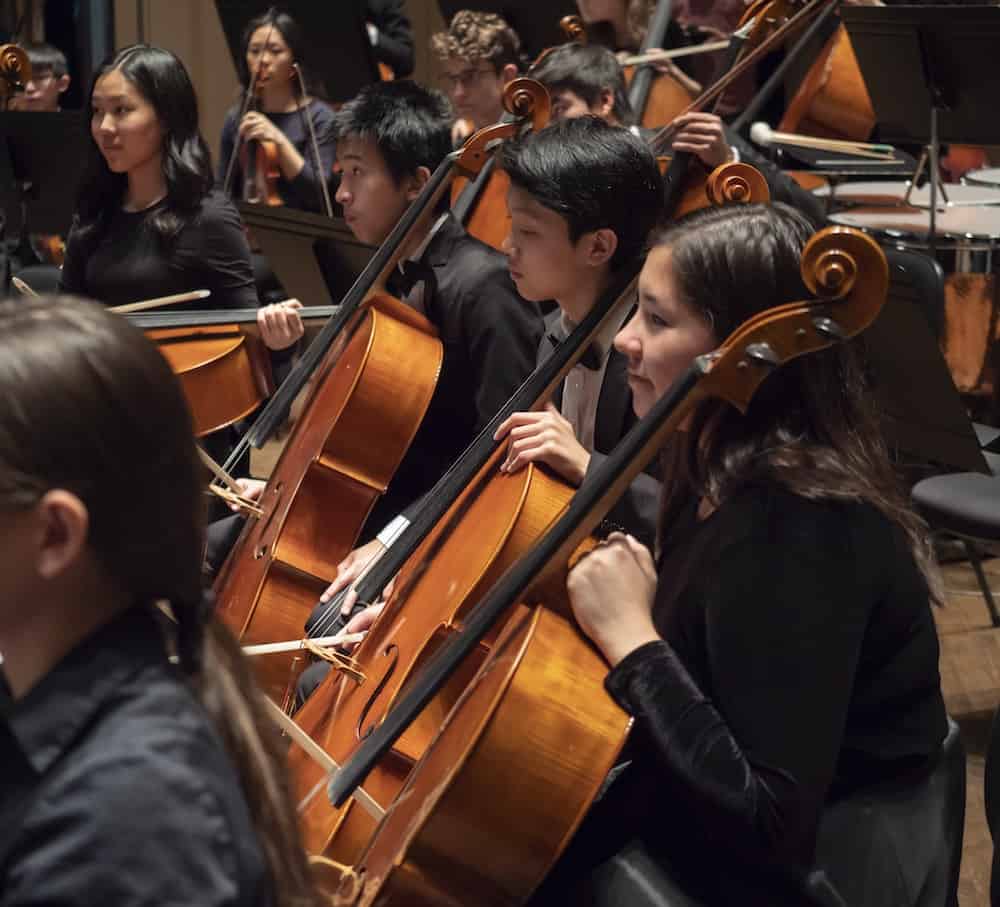
This spring, there’s new talent onstage in Portland — kids and teens are bringing excitement and focus, passion and real chops, to the stage. Here are three great reasons to check out these up-and-comers.
The performances are exciting — because the performers are excited. “Everything is like a world premiere to them. There’s an immediacy to their performance that any audience can sense,” says David Hattner, musical director of the Portland Youth Philharmonic.
Hattner conducts the Portland Youth Philharmonic, 100+ young musicians ranging in age from 11 to 18. “The youngest ones can look like very small children, until you see them play,” says Hattner. “Then you know that you’re in the presence of great music.” In March, they will perform Brahms Fourth Symphony.
But young classical musicians are not the only performers to put their incredible hard work on display. Just ask M’Liss Stephenson, director of JCo and NEO, two companies of young dancers at Polaris Dance Theatre. Her dancers range in age from 9 to 18. “I find myself extremely proud all the time,” she says. “There’s such a responsibility to themselves and to their peers — to be strong students, to be considerate and thoughtful, be strong peers, to work hard.”
At PYP, Hattner sees that responsibility translate to an audience of young people. They sit up and pay attention. “Our musicians are doing this remarkable job creating an ensemble out of 100 people,” says Hattner. “Kids in our audience think, ‘this is right here in town, we’re in the same room with them, I could be doing that.’”
Art is a way to communicate — and it’s time we hear what Portland’s young artists have to say.
“Music is an outlet to express feelings and emotions,” says Hattner. “Adults are not good at listening to what young people have to say. It’s incumbent upon us adults now to reconsider that — because my young musicians make a lot more sense than a lot of adults right now. ”
Music:
Portland Youth Philharmonic
Brahms Fourth Symphony
Saturday, March 7, 7:30 pm
Arlene Schnitzer Concert Hall
Best for ages 7 and up
Portland Youth Philharmonic
Youth String Ensemble
Cushion Concerts
Sunday, March 8,
12:30 pm and 2:30 pm
Cascade Ballroom at The Oregon Zoo
For ages 2 to 8
Portland Youth Philharmonic
Family Concert
Saturday, May 9, 2 pm
IRCO Community Center
All ages
For tickets and information: portlandyouthphil.org.
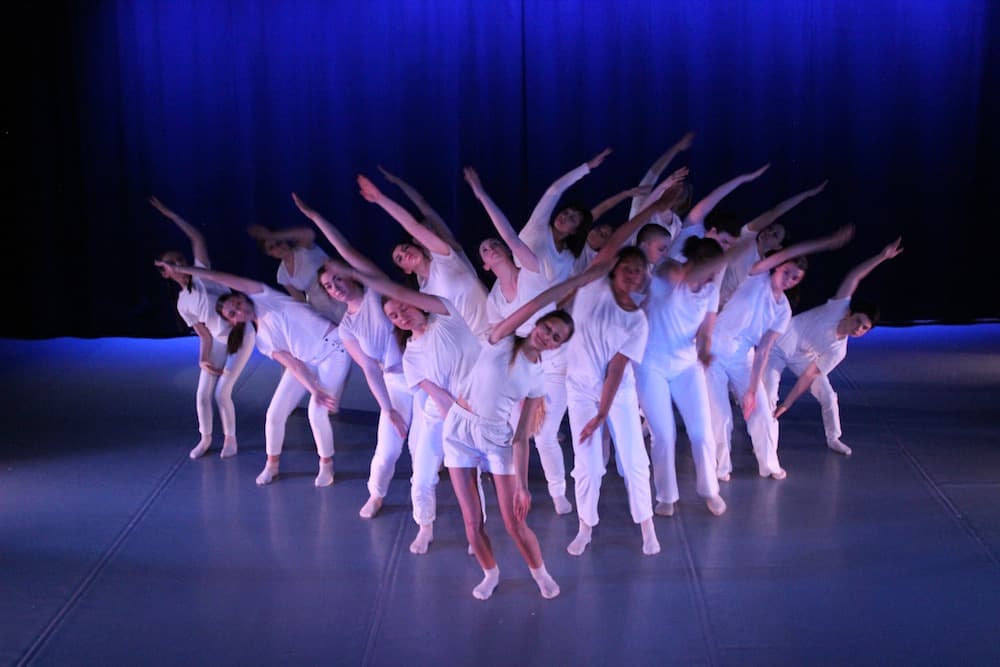
Dance:
Polaris JCo + NEO Show
Saturday-Sunday, April 25-26
Polaris Dance Theatre
Oregon Ballet Theatre
Annual School Performance
Saturday-Sunday, June 13-14
Newmark Theatre
Obt.org.
Social Justice for the Juice-box Set
Children’s music today goes way beyond the ABCs. Family musicians are tackling issues of social justice, inequity and inclusion in songs for preschoolers.
Take the Alphabet Rockers’ politically pointed song, Walls, which protests U.S. immigration policy in its catchy hook: “These walls can’t stop the love/These walls can’t hold us down.” Even Raffi, the elder statesman of kinder song, has something urgent to say. Sure, he still croons classics like Baby Beluga, but he also delivers potent messages of inclusion in newer songs like Love Grows Love.
Portland musicians are in on the act, too — delivering great music and big messages to their pint-sized audiences. We talked to two local children’s musicians to find out more.
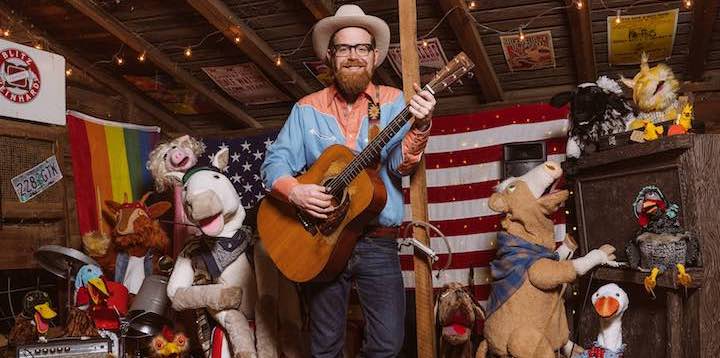
Kids and families are leading the charge, according to Andy Furgeson. “Kids and youth are engaged and energized in a way that they’ve never been before. It calls on me to step up my game — to try to address bigger issues,” says Furgeson, who performs as Red Yarn, the folk and family music powerhouse. “I’m grappling with how to talk to my kids about this stuff, too.” Inspired by the strong women in his life, Furgeson adapted the lyrics to an old folk song and wrote Old Hen Cackled, which casts the hen as a political activist.

Last year, Aaron Nigel Smith’s politically minded all-ages album In Our America topped the Reggae Billboard Charts. In his children’s music, Smith uses imagination and play to introduce ideas of social justice. “It’s about making space for kids to explore ideas in their own time and at their own pace,” says Smith. “There’s hope yet, if we hold space for the kids. They really have more of the answers that we’re seeking than we realize.”
Their respective genres also inspire both these musicians to speak out. Smith and Furgeson both work in traditions that have long lent voices to protest movements. Think of Bob Marley’s reggae anthem “Get Up, Stand Up,” or the folk songs of Pete Seeger. “There’s a long tradition of folk music speaking truth to power,” says Furgeson. “Some of the most potent, powerful protest music today is being made for kids and families.”
In truth, the act of making music together can feel like an act of social justice all by itself. “Music is a leveler,” says Smith. “It creates equality in a very organic sense.”
Where to find them:
Red Yarn performs in Portland three times a week. “I do a lot of stripped down live performances. It’s just me and my boots stomping out the rhythm section,” says Furgeson, who performs with a host of puppet critters and is sometimes accompanied by his wife, Miss Jessie. His new album is due late this summer, so keep your eyes out for a big band show!
“I take making music for youth very, very seriously,” says Aaron Nigel Smith. He’s working on a live greatest kids’ hits album recorded with children’s choirs in Los Angeles and New York. Watch for his forthcoming video series, the Big Up Show, made with Portland kids.
- Spring Arts Preview - February 20, 2020
- Fall Arts Preview - October 27, 2019
- Spring Arts Preview: Portland-area Performances for Families - March 18, 2019






